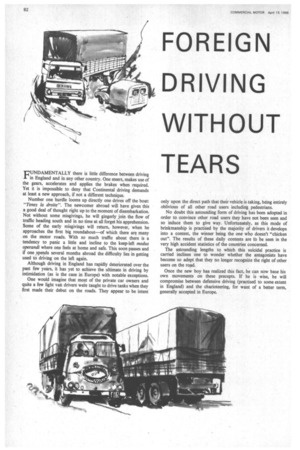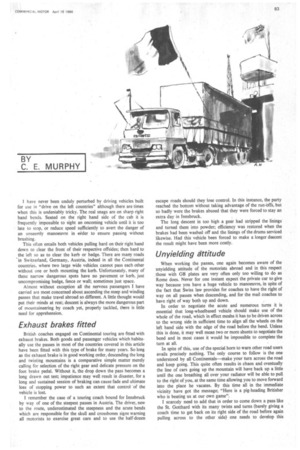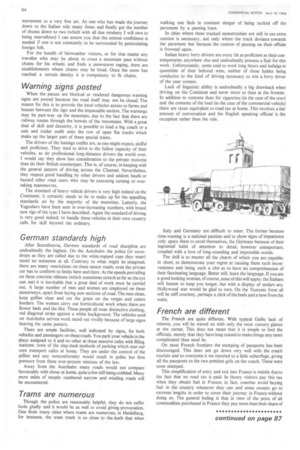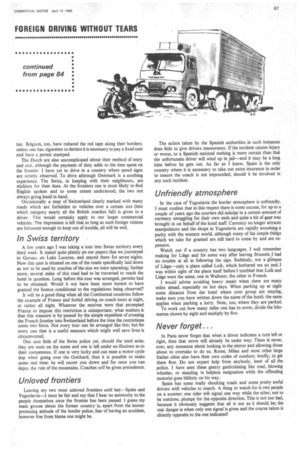FOREIGN DRIVING WITHOUT TEARS
Page 84

Page 85

Page 86

Page 89

If you've noticed an error in this article please click here to report it so we can fix it.
FUNDAMENTALLY there is little difference between driving in England and in any other country. One steers, makes use of the gears, accelerates and applies the brakes when required. Yet it is impossible to deny that Continental driving demands at least a new approach, if not a different technique.
Number one hurdle looms up directly one drives off the boat: "Tenez la droite". The newcomer abroad will have given this a good deal of thought right up to the moment of disembarkation. Not without some misgivings, he will gingerly join the flow of traffic heading south and in no time at all forget his apprehension. Some of the early misgivings will return, however, when he approaches the first big roundabout—of which there are many on the motor roads. With so much traffic about there is a tendency to panic a little and incline to the keep-left modus operandi where one feels at home and safe. This soon passes and if one spends several months abroad the difficulty lies in getting used to driving on the left again.
Although driving in England has rapidly deteriorated over the past few years, it has yet to achieve the ultimate in driving by intimidation (as is the case in Europe) with notable exceptions.
One would imagine that most of the private car owners and quite a few light van drivers were taught to drive tanks when they first made their debut on the roads. They appear to be intent
only upon the direct path that their vehicle is taking, being entirely oblivious of all other road users including pedestrians.
No doubt this astounding form of driving has been adopted in order to convince other road users they have not been seen and so induce them to give way. Unfortunately, as this mode of brinkmanship is practised by the majority of drivers it develops into a contest, the winner being the one who doesn't "chicken out". The results of these daily contests are to be seen in the very high accident statistics of the countries concerned.
The astounding lengths to which this suicidal practice is carried inclines one to wonder whether the antagonists have become so adept that they no longer recognize the right of other users on the road.
Once the new boy has realized this fact, he can now base his own movements on these precepts. If he is wise, he will compromise between defensive driving (practised to some extent in England) and the charioteering, for want of a better term, generally accepted in Europe. I have never been unduly perturbed by driving vehicles built for use in "drive on the left countries" although there are times when this is undeniably tricky. The real snags are on sharp right hand bends. Seated on the right hand side of the cab it is frequently impossible to sight an oncoming vehicle until it is too late to stop, or reduce speed sufficiently to avert the danger of an unseemly manoeuvre in order to ensure passing without brushing.
This often entails both vehicles pulling hard on their right hand down to clear the front of their respective offsides; then hard to the left so as to clear the kerb or hedge. There are marry roads ' in Switzerland, Germany, Austria, indeed in all the Continental countries, where two large wide vehicles cannot pass each other without one or both mounting the kerb. Unfortunately, many of these narrow dangerous spots have no pavement or kerb, just uncompromising hedge, fence or wall; sometimes just space.
Almost without exception all the nervous passengers I have carried are most concerned about ascending the steep and winding passes that make travel abroad so different. A little thought would put their minds at rest; descent is always the more dangerous part of mountaineering by coach yet, properly tackled, there is little need for apprehension.
Exhaust brakes fitted
British coaches engaged on Continental touring are fitted with exhaust brakes. Both goods and passenger vehicles which habitually use the passes in most of the countries covered in this article have been fitted with this type of brake for many years. So long as the exhaust brake is in good working order, descending the long and twisting mountains is a comparative simple matter merely calling for selection of the right gear and delicate pressure on the foot brake pedal. Without it, the drop down the pass becomes a long drawn out test; impatience may well result in disaster, for a long and sustained session of braking can cause fade and ultimate loss of stopping power to such an extent that control of the vehicle is lost.
I remember the case of a touring coach bound for Innsbruck by way of one of the steepest passes in Austria. The driver, new to the route, underestimated the steepness and the acute bends which are responsible for the skull and crossbones signs warning all motorists to exercise great care and to use the half-dozen escape roads should they lose control. In this instance, the party reached the bottom without taking advantage of the run-offs, but so badly were the brakes abused that they were forced to stay an extra day in Innsbruck.
The long descent in too high a gear had stripped the linings and turned them into powder; efficiency was restored when the brakes had been washed off and the linings of the drums serviced likewise. Had this vehicle been forced to make a longer descent the result might have been more costly.
Unyielding attitude
When working the passes, one again becomes aware of the unyielding attitude of the motorists abroad and in this respect those with GB plates are very often only too willing to do as Rome does. Never for one instant expect the private car to give way because you have a huge vehicle to manoeuvre, in spite of the fact that Swiss law provides for coaches to have the right of way on all passes when descending, and for the mail coaches to have right of way both up and down.
In order to negotiate the acute and numerous turns it is essential that long-wheelbased vehicle should make use of the whole of the road, which in effect mulls it has to be driven across to the wrong side in sufficient time to align all the wheels on the left hand side with the edge of the road before the bend. Unless this is done, it may well mean two or more shunts to negotiate the bend and in most cases it would be impossible to complete the turn at all.
In spite of this, use of the special horn to warn other road users avails precisely nothing. The only course to follow is the one understood by all Continentals—make your turn across the road and keep going. This quite often results in chaos and eventually the line of cars going up the mountain will have back up a little until the one breathing all over your radiator will be able to pull to the right of you, at the same time allowing you to move forward into the place he vacates. By this time all in the immediate vicinity have got the message; "Here is a pig-heading Britisher who is beating us at our own game".
I scarcely need to add that in order to come down a pass like the St. Gotthard with its many twists and turns (barely giving a coach time to get back on its right side of the road before again pulling across to the other side) one needs to develop this movement to a very fine art. As one who has made the journey down to the Italian side many times and finally got the number of shunts down to two (which with all due modesty I will own to being marvellous) I can assure you that the utmost confidence is needed if one is not constantly to be surrounded by gesticulating foreign folk.
For the benefit of fairweather visitors, or for that matter any traveller who may be about to cross a mountain pass without chains for his wheels and finds a snowstorm raging, there are establishments where chains may be hired. Once the snow has reached a certain density it is compulsory to fit chains.
Warning signs posted
When the passes are blocked or rendered dangerous warning signs are posted because the road itself may not be closed. The reason for this is to provide the local vehicles access to farms and houses between the sign and the impassable section. The warnings may be part-way up the mountain, due to the fact that there are railway routes through the bowels of the mountains. With a great deal of skill and dexterity, it is possible to load a big coach or a unit and trailer outfit onto the row of open flat trucks which make up the larger part of these special trains.
The drivers of the haulage outfits are, as one might expect, skilful and proficient. They tend to drive to the fullest capacity of their vehicles, as do professional long-distance drivers the world over. I would say they show less consideration to the private motorist than do their British counterpart. This is, of course, in keeping with the general pattern of driving across the Channel. Nevertheless, they respect good handling by other drivers and seldom baulk or hazard other road users who may be executing turning or overtaking manoeuvres,
The standard of heavy vehicle drivers is very high indeed on the Continent; it certainly needs to be to make up for the appalling standards set by the majority of the motorists. Latterly, the Yugoslays have been seen in ever-increasing numbers, with brand new rigs of the type! have described. Again the standard of driving is very good indeed; to handle these vehicles in their own country calls for skill beyond the ordinary.
German standards high
After Scandinavia, German standards of road discipline are undoubtedly the highest. On the Autobahn the police (or snowdrops as they are called due to the white-topped caps they wear) stand no nonsense at all. Contrary to what might be imagined, there are many restrictions on these motor roads; even the private car has to conform to limits here and there. At the speeds prevailing on these concrete ribbons (which sometimes stretch as far as the eye can see) it is inevitable that a great deal of work must be carried out. A large number of men and women are employed on these motorways, apart from laying new sections of road. The men clean, keep gullies clear and cut the grass on the verges and centre borders. The women carry out horticultural work where there are flower beds and the like. These people all wear distinctive clothing, red diagonal strips against a white background. The vehicles used on Autobahn service work stand out vividly because of large signs bearing the same pattern.
There are ample facilities, well indicated by signs, for both vehicles and passengers on these roads. You park your vehicle in the place assigned to it and no other at these massive cafes with filling stations; none of the slap-dash methods of parking which mar our own transport cafes at home. They are under the control of the police and any nonconformity would result in polite but firm pressure from these ever-present minions of the law.
Away from the Autobahn many roads would not compare favourably with those at home, quite a few still being cobbled. Many more miles of steeply cambered narrow and winding roads will be encountered.
Trams are numerous
Though the police are reasonably helpftil, they do not suffer fools gladly and it would be as well to avoid giving provocation. One finds many cities where trams are numerous; in Heidelberg, for instance, the tram track is so close to the-kerb that when walking one feels in constant danger of being sucked off the pavement by a passing tram.
In cities where these tracked monstrosities are still in use extra caution is necessary, not only where the track deviates towards the pavement but because the custom of passing on their offside is frowned upon.
Italian heavy lorry drivers are every bit as proficient as their contemporaries anywhere else and undoubtedly possess a flair for this work. Unfortunately, some tend to work long hours and indulge in quantities of their beloved wine, neither of these habits being conducive to the kind of driving necessary to win a lorry driver of the year contest.
Lack of linguistic ability is undoubtedly a big drawback when driving on the Continent and never more so than at the frontier. In addition to customs dues for cigarettes (in the case of the tour) and the contents of the load (in the case of the commercial vehicle) there are taxes equivalent to road tax at home. This involves a fair amount of conversation and the English speaking official is the exception rather than the rule.
Italy and Germany are difficult to enter. The former because time-wasting is a national pastime and to show signs of impatience only spurs them to excel themselves, the Germans because of their ingrained habit of attention to detail, however unimportant, coupled with a love of long-sounding and impossible words.
The drill is to muster all the charm of which you are capable; in short, to demonstrate your regret at causing them such inconvenience and being such a clot as to have no comprehension of their fascinating language. Better still, learn the language. If you are a good looking woman, of course, none of this will apply; the Italians will hasten to keep you longer, but with a display of molars any Hollywood star would be glad to own. On the Teutonic front all will be stiff courtesy, perhaps a click of the heels and a bow from the waist.
French are different
The French are quite different. With typical Gallic lack of interest, you will be waved on with only the most cursory glance at the carnet. This does not mean that it is simple to fool the officials, merely that they have long ceased to make things any more complicated than need be.
On most French frontiers the• stamping of passports has been discouraged. This does not go down very well with the coach tourists and to overcome it we resorted to a little subterfuge, giving all the passports to the two prettiest girls on the coach. These were soon stamped.
This simplification of entry and exit into France is mainly due to the fact that no road tax is paid. In theory visitors pay this tax when they obtain fuel in France; in fact, coaches avoid buying fuel in the country whenever they can and some owners go to extreme lengths in order to cover their journey in France without doing so. The general feeling is that in view of the price of all commodities purchased in France they pay more than their share of tax. Belgium, too, have reduced the red tape along their borders; unless one has cigarettes to declare it is necessary to pay a fixed sum and have a permit stamped.
The Dutch are also uncomplicated about their method of entry and exit, although the payment of duty adds to the time spent on the frontier. I have yet to drive in a country where speed signs are strictly observed. To drive athrough Denmark is a soothing experience. The Swiss, in keeping with their neighbours, are sticklers for their dues. At the frontiers one is most likely to find English spoken and to some extent understood; the two not always going hand in hand.
Occasionally a map of Switzerland clearly marked with many roads which are forbidden to vehicles over a certain size (into which category nearly all the British coaches fall) is given to a driver. This would certainly apply to our larger commercial vehicles. The impression is left that so long as such foreign visitors are fortunate enough to keep out of trouble, all will be well.
In Swiss territory
A few years ago I was taking a tour into Swiss territory every third week. It stated quite plainly on our papers that we journeyed to Gersau. on Lake Lucerne, and stayed there for seven nights. Now this spot is situated on one of the roads specifically laid down as not to be used by coaches of the size we were operating; further more, several miles of this road had to be traversed to reach the hotel in question. Long before this tour was arranged, permits had to be obtained. Would it not have been more honest to have granted the licence conditional to the regulations being observed?
It will be a good thing when all the Continental countries follow the example of France and forbid driving on coach tours at night, or rather all night. Whatever the motives were that prompted France to impose this restriction is unimportant; what matters is that this measure is by-passed by the simple expedient of crossing the French frontier into Switzerland before the time the restrictions come into force. Not every tour can be arranged like this; but for every one that is a useful measure which might well save lives is circumvented.
One sees little of the Swiss police yet, should the need arise, they are soon on the scene and one is left under no illusions as to their competence. If one is very lucky and can meet a motor cycle Cop when going over the Gotthard, then it is possible to make some real time; he will escort you down and for once you can enjoy the rule of the mountains. Coaches will be given precedence.
Unloved frontiers
Leaving my two most unloved frontiers until last—Spain and Yugoslavia—I must be fair and say that I bear no animosity to the people themselves once the frontier has been passed. I guess my main grouse about the former country is, apart from the 111COMpromising attitude of the border police, fear of having an accident, however free from blame one might be.
The action taken by the Spanish authorities in such instances does little to give drivers reassurance. If the incident causes injury or worse, to a Spanish national nothing is more certain than that the unfortunate driver will wind up in jail—and it may be a long time before he gets out. As far as I know, Spain is the only country where it is necessary to take out extra insurance in order to ensure the coach is not impounded, should it be involved in any such incident.
Unfriendly atmosphere
In the case of Yugoslavia the border atmosphere is unfriendly. I must confess that in this respect there is some excuse, for up to a couple of years ago the couriers did indulge in a certain amount of currency smuggling for their own ends and quite a bit of gear was brought in on behalf of the hotel staff. Currency no longer attracts manipulators and the shops in Yugoslavia are rapidly assuming a parity with the western world, although many of the simple things which we take for granted are still hard to come by and are expensive.
Watch out if a country has two languages. I well remember making for Liege and for some way after leaving Brussels I had no trouble at all in following the sign. Suddenly, not a glimpse of Liege—only a place called Luik, which bothered me no end. I was within sight of the place itself before I tumbled that Luik and Liege were the same, one in Walloon; the other in French.
I would advise avoiding heavy meals when there are many miles ahead, especially on hot days. When parking up at night some distance from the hotel where your group are staying, make sure you have written down the name of the hotel; the same applies when parking a lorry. Note, too, where they are parked.
To work out how many miles one has to cover, divide the kilometres shown by eight and multiply by five.
Never forget...
In Paris never forget that when a driver indicates a turn left or right, then that move will already be under way. There is never, ever, any nonsense about looking in the mirror and allowing those about to overtake to do so. Rome, Milan and most other large Italian cities also have their own codes of conduct; briefly, to get there first. Do not expect help from anybody, least of all the police. I have seen these gentry gesticulating like mad, blowing whistles, or standing in helpless resignation while the offending motorist goes blithely on his way.
Spain has some really shocking roads and some pretty awful drivers with vehicles to match. A thing to watch for is two people on a scooter; one rider will signal one way while the other, not to be outdone, plumps for the opposite direction. This is not too bad, because it obviously suggests that all is not as it should be; the real danger is when only one signal is given and the course taken is directly opposite to the one indicated!








































































































































